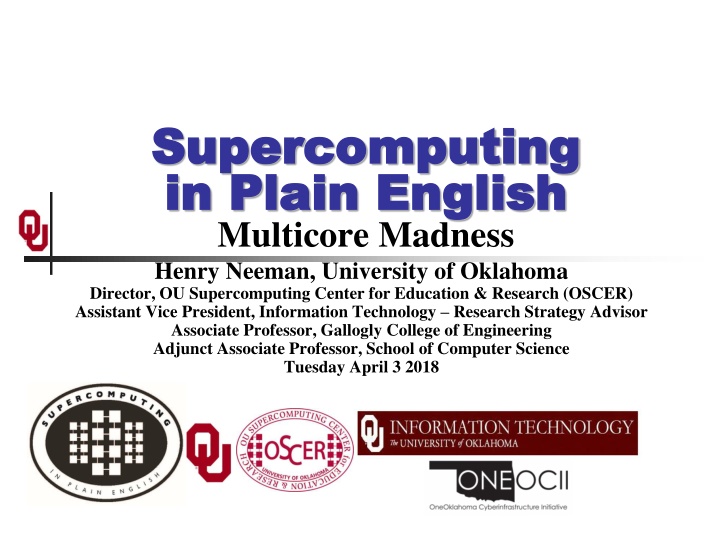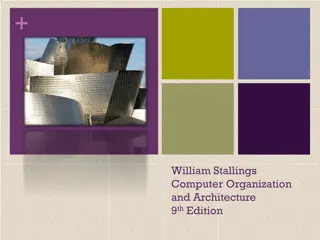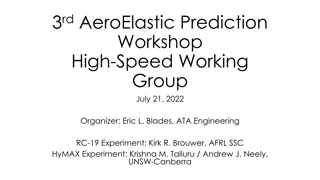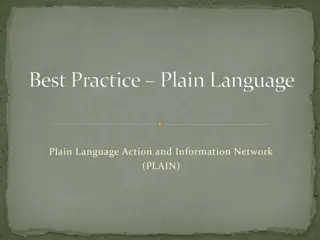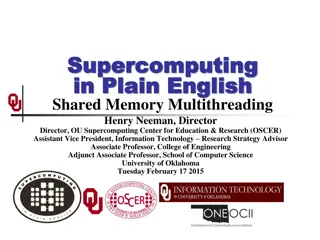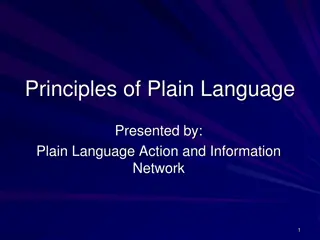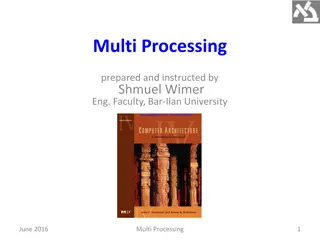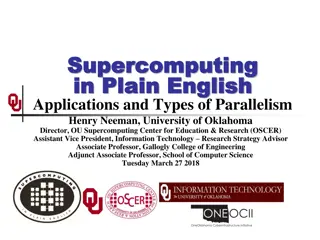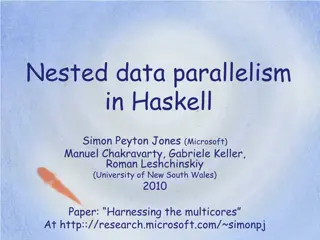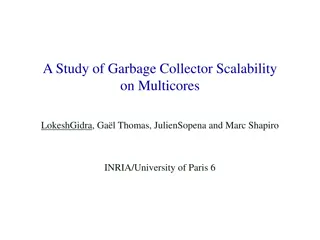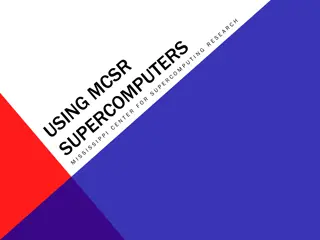Supercomputing in Plain English: Multicore Madness Workshop Details
Prepare for the "Supercomputing in Plain English: Multicore Madness" workshop with important instructions such as muting yourself, downloading slides in advance, and accessing the session via Zoom or YouTube. The session, led by Henry Neeman from the University of Oklahoma, covers supercomputing topics in an easy-to-understand manner. Take note of the provided links and follow the guidelines for a seamless learning experience.
Download Presentation

Please find below an Image/Link to download the presentation.
The content on the website is provided AS IS for your information and personal use only. It may not be sold, licensed, or shared on other websites without obtaining consent from the author.If you encounter any issues during the download, it is possible that the publisher has removed the file from their server.
You are allowed to download the files provided on this website for personal or commercial use, subject to the condition that they are used lawfully. All files are the property of their respective owners.
The content on the website is provided AS IS for your information and personal use only. It may not be sold, licensed, or shared on other websites without obtaining consent from the author.
E N D
Presentation Transcript
Supercomputing Supercomputing in Plain English in Plain English Multicore Madness Henry Neeman, University of Oklahoma Director, OU Supercomputing Center for Education & Research (OSCER) Assistant Vice President, Information Technology Research Strategy Advisor Associate Professor, Gallogly College of Engineering Adjunct Associate Professor, School of Computer Science Tuesday April 3 2018
This is an experiment! It s the nature of these kinds of videoconferences that FAILURES ARE GUARANTEED TO HAPPEN! NO PROMISES! So, please bear with us. Hopefully everything will work out well enough. If you lose your connection, you can retry the same kind of connection, or try connecting another way. Remember, if all else fails, you always have the phone bridge to fall back on. PLEASE MUTE YOURSELF. PLEASE MUTE YOURSELF. PLEASE MUTE YOURSELF. Supercomputing in Plain English: Multicore Tue Apr 3 2018 2
PLEASE MUTE YOURSELF No matter how you connect, PLEASE MUTE YOURSELF, so that we cannot hear you. At OU, we will turn off the sound on all conferencing technologies. That way, we won t have problems with echo cancellation. Of course, that means we cannot hear questions. So for questions, you ll need to send e-mail: supercomputinginplainenglish@gmail.com PLEASE MUTE YOURSELF. PLEASE MUTE YOURSELF. PLEASE MUTE YOURSELF. Supercomputing in Plain English: Multicore Tue Apr 3 2018 3
Download the Slides Beforehand Before the start of the session, please download the slides from the Supercomputing in Plain English website: http://www.oscer.ou.edu/education/ That way, if anything goes wrong, you can still follow along with just audio. PLEASE MUTE YOURSELF. PLEASE MUTE YOURSELF. PLEASE MUTE YOURSELF. Supercomputing in Plain English: Multicore Tue Apr 3 2018 4
Zoom Go to: http://zoom.us/j/979158478 Many thanks Eddie Huebsch, OU CIO, for providing this. PLEASE MUTE YOURSELF. PLEASE MUTE YOURSELF. PLEASE MUTE YOURSELF. Supercomputing in Plain English: Multicore Tue Apr 3 2018 5
YouTube You can watch from a Windows, MacOS or Linux laptop or an Android or iOS handheld using YouTube. Go to YouTube via your preferred web browser or app, and then search for: Supercomputing InPlainEnglish (InPlainEnglish is all one word.) Many thanks to Skyler Donahue of OneNet for providing this. PLEASE MUTE YOURSELF. PLEASE MUTE YOURSELF. PLEASE MUTE YOURSELF. Supercomputing in Plain English: Multicore Tue Apr 3 2018 6
Twitch You can watch from a Windows, MacOS or Linux laptop or an Android or iOS handheld using Twitch. Go to: http://www.twitch.tv/sipe2018 Many thanks to Skyler Donahue of OneNet for providing this. PLEASE MUTE YOURSELF. PLEASE MUTE YOURSELF. PLEASE MUTE YOURSELF. Supercomputing in Plain English: Multicore Tue Apr 3 2018 7
Wowza #1 You can watch from a Windows, MacOS or Linux laptop using Wowza from the following URL: http://jwplayer.onenet.net/streams/sipe.html If that URL fails, then go to: http://jwplayer.onenet.net/streams/sipebackup.html Many thanks to Skyler Donahue of OneNet for providing this. PLEASE MUTE YOURSELF. PLEASE MUTE YOURSELF. PLEASE MUTE YOURSELF. Supercomputing in Plain English: Multicore Tue Apr 3 2018 8
Wowza #2 Wowza has been tested on multiple browsers on each of: Windows 10: IE, Firefox, Chrome, Opera, Safari MacOS: Safari, Firefox Linux: Firefox, Opera We ve also successfully tested it via apps on devices with: Android iOS Many thanks to Skyler Donahue of OneNet for providing this. PLEASE MUTE YOURSELF. PLEASE MUTE YOURSELF. PLEASE MUTE YOURSELF. Supercomputing in Plain English: Multicore Tue Apr 3 2018 9
Toll Free Phone Bridge IF ALL ELSE FAILS, you can use our US TOLL phone bridge: 405-325-6688 684 684 # NOTE: This is for US call-ins ONLY. PLEASE MUTE YOURSELF and use the phone to listen. Don t worry, we ll call out slide numbers as we go. Please use the phone bridge ONLY IF you cannot connect any other way: the phone bridge can handle only 100 simultaneous connections, and we have over 1000 participants. Many thanks to OU CIO Eddie Huebsch for providing the phone bridge.. Supercomputing in Plain English: Multicore Tue Apr 3 2018 10
Please Mute Yourself No matter how you connect, PLEASE MUTE YOURSELF, so that we cannot hear you. (For YouTube, Twitch and Wowza, you don t need to do that, because the information only goes from us to you, not from you to us.) At OU, we will turn off the sound on all conferencing technologies. That way, we won t have problems with echo cancellation. Of course, that means we cannot hear questions. So for questions, you ll need to send e-mail. PLEASE MUTE YOURSELF. Supercomputing in Plain English: Multicore Tue Apr 3 2018 11
Questions via E-mail Only Ask questions by sending e-mail to: supercomputinginplainenglish@gmail.com All questions will be read out loud and then answered out loud. DON T USE CHAT OR VOICE FOR QUESTIONS! No one will be monitoring any of the chats, and if we can hear your question, you re creating an echo cancellation problem. PLEASE MUTE YOURSELF. PLEASE MUTE YOURSELF. Supercomputing in Plain English: Multicore Tue Apr 3 2018 12
Onsite: Talent Release Form If you re attending onsite, you MUST do one of the following: complete and sign the Talent Release Form, OR sit behind the cameras (where you can t be seen) and don t talk at all. If you aren t onsite, then PLEASE MUTE YOURSELF. Supercomputing in Plain English: Multicore Tue Apr 3 2018 13
TENTATIVE Schedule Tue Jan 23: Storage: What the Heck is Supercomputing? Tue Jan 30: The Tyranny of the Storage Hierarchy Part I Tue Feb 6: The Tyranny of the Storage Hierarchy Part II Tue Feb 13: Instruction Level Parallelism Tue Feb 20: Stupid Compiler Tricks Tue Feb 27: Multicore Multithreading Tue March 6: Distributed Multiprocessing Tue March 13: NO SESSION (Henry business travel) Tue March 20: NO SESSION (OU's Spring Break) Tue March 27: Applications and Types of Parallelism Tue Apr 3: Multicore Madness Tue Apr 10: NO SESSION (Henry business travel) Tue Apr 17: High Throughput Computing Tue Apr 24: GPGPU: Number Crunching in Your Graphics Card Tue May 1: Grab Bag: Scientific Libraries, I/O Libraries, Visualization Supercomputing in Plain English: Multicore Tue Apr 3 2018 14
Thanks for helping! OU IT OSCER operations staff (Dave Akin, Patrick Calhoun, Kali McLennan, Jason Speckman, Brett Zimmerman) OSCER Research Computing Facilitators (Jim Ferguson, Horst Severini) Debi Gentis, OSCER Coordinator Kyle Dudgeon, OSCER Manager of Operations Ashish Pai, Managing Director for Research IT Services The OU IT network team OU CIO Eddie Huebsch OneNet: Skyler Donahue Oklahoma State U: Dana Brunson Supercomputing in Plain English: Multicore Tue Apr 3 2018 15
This is an experiment! It s the nature of these kinds of videoconferences that FAILURES ARE GUARANTEED TO HAPPEN! NO PROMISES! So, please bear with us. Hopefully everything will work out well enough. If you lose your connection, you can retry the same kind of connection, or try connecting another way. Remember, if all else fails, you always have the phone bridge to fall back on. PLEASE MUTE YOURSELF. PLEASE MUTE YOURSELF. PLEASE MUTE YOURSELF. Supercomputing in Plain English: Multicore Tue Apr 3 2018 16
Coming in 2018! Coalition for Advancing Digital Research & Education (CADRE) Conference: Apr 17-18 2018 @ Oklahoma State U, Stillwater OK USA https://hpcc.okstate.edu/cadre-conference Linux Clusters Institute workshops http://www.linuxclustersinstitute.org/workshops/ Introductory HPC Cluster System Administration: May 14-18 2018 @ U Nebraska, Lincoln NE USA Intermediate HPC Cluster System Administration: Aug 13-17 2018 @ Yale U, New Haven CT USA Great Plains Network Annual Meeting: details coming soon Advanced Cyberinfrastructure Research & Education Facilitators (ACI-REF) Virtual Residency Aug 5-10 2018, U Oklahoma, Norman OK USA PEARC 2018, July 22-27, Pittsburgh PA USA https://www.pearc18.pearc.org/ IEEE Cluster 2018, Sep 10-13, Belfast UK https://cluster2018.github.io OKLAHOMA SUPERCOMPUTING SYMPOSIUM 2018, Sep 25-26 2018 @ OU SC18 supercomputing conference, Nov 11-16 2018, Dallas TX USA http://sc18.supercomputing.org/ Supercomputing in Plain English: Multicore Tue Apr 3 2018 17
Outline The March of Progress Multicore/Many-core Basics Software Strategies for Multicore/Many-core A Concrete Example: Weather Forecasting Supercomputing in Plain English: Multicore Tue Apr 3 2018 18
OUs TeraFLOP Cluster, 2002 10 racks @ 1000 lbs per rack 270 Pentium4 Xeon CPUs, 2.0 GHz, 512 KB L2 cache 270 GB RAM, 400 MHz FSB 8 TB disk Myrinet2000 Interconnect 100 Mbps Ethernet Interconnect OS: Red Hat Linux Peak speed: 1.08 TFLOPs (1.08 trillion calculations per second) One of the first Pentium4 clusters! boomer.oscer.ou.edu Supercomputing in Plain English: Multicore Tue Apr 3 2018 20
What does 1 TFLOPs Look Like? 2002: Row 2012: Card 1 TFLOPs: trillion calculations per second 1997: Room AMD FirePro W9000[15] ASCI RED[14] Sandia National Lab NVIDIA Kepler K20[16] AMD EPYC CPU Chip 2017 boomer.oscer.ou.edu In service 2002-5: 11 racks Intel MIC Xeon PHI[17] https://www.top500.org/static/media/uploads/.thumbnails/epyc-vs-xeon.jpg/epyc-vs-xeon-742x382.jpg Intel Skylake Supercomputing in Plain English: Multicore Tue Apr 3 2018 21
Moores Law In 1965, Gordon Moore was an engineer at Fairchild Semiconductor. He noticed that the number of transistors that could be squeezed onto a chip was doubling about every 18 months. It turns out that computer speed is roughly proportional to the number of transistors per unit area. Moore wrote a paper about this concept, which became known as Moore s Law. Supercomputing in Plain English: Multicore Tue Apr 3 2018 22
Moores Law in Practice log(Speed) Year Supercomputing in Plain English: Multicore Tue Apr 3 2018 23
Moores Law in Practice log(Speed) Year Supercomputing in Plain English: Multicore Tue Apr 3 2018 24
Moores Law in Practice log(Speed) Year Supercomputing in Plain English: Multicore Tue Apr 3 2018 25
Moores Law in Practice log(Speed) Year Supercomputing in Plain English: Multicore Tue Apr 3 2018 26
Moores Law in Practice log(Speed) Year Supercomputing in Plain English: Multicore Tue Apr 3 2018 27
Fastest Supercomputer vs. Moore 2017: 10,649,600 CPU cores, 93,014,600 GFLOPs 100,000,000 10,000,000 (HPL benchmark) GFLOPs Moore 1,000,000 100,000 10,000 1,000 100 1993: 1024 CPU cores, 59.7 GFLOPs GFLOPs billions of calculations per second 10 1 1990 1995 2000 2005 2010 2015 2020 www.top500.org Year Supercomputing in Plain English: Overview Tue Jan 23 2018 28
The Tyranny of the Storage Hierarchy
The Storage Hierarchy Fast, expensive, few Registers Cache memory Main memory (RAM) Hard disk Removable media (CD, DVD etc) Internet Slow, cheap, a lot [5] Supercomputing in Plain English: Multicore Tue Apr 3 2018 30
RAM is Slow CPU 653 GB/sec The speed of data transfer between Main Memory and the CPU is much slower than the speed of calculating, so the CPU spends most of its time waiting for data to come in or go out. Bottleneck 15 GB/sec (2.3%) Supercomputing in Plain English: Multicore Tue Apr 3 2018 31
Why Have Cache? CPU Cache is much closer to the speed of the CPU, so the CPU doesn t have to wait nearly as long for stuff that s already in cache: it can do more operations per second! 46 GB/sec (7%) 15 GB/sec (2.3%)(1%) Supercomputing in Plain English: Multicore Tue Apr 3 2018 32
Henrys Laptop Intel Core i3-4010U dual core, 1.7 GHz, 3 MB L3 Cache Dell Latitude E5540[4] 12 GB 1600 MHz DDR3L SDRAM 340 GB SATA 5400 RPM Hard Drive DVD+RW/CD-RW Drive 1 Gbps Ethernet Adapter http://content.hwigroup.net/images /products/xl/204419/dell_latitude_ e5540_55405115.jpg Supercomputing in Plain English: Multicore Tue Apr 3 2018 33
Storage Speed, Size, Cost Registers (Intel Core2 Duo 1.6 GHz) Cache Memory (L3) Main Memory (1600MHz DDR3L SDRAM) Hard Drive Ethernet (1000 Mbps) DVD+R (16x) Phone Modem (56 Kbps) Henry s Laptop Speed (MB/sec) [peak] 668,672[6] (16 GFLOP/s*) 46,000 15,000 [7] 100[9] 125 32 [10] 0.007 340,000 Size (MB) 464 bytes** [11] 3 12,288 4096 times as much as cache unlimited unlimited unlimited Cost ($/MB) $38 [12] $0.0084 [12] ~1/4500 as much as cache $0.00003 [12] charged per month (typically) $0.000045 [12] charged per month (typically) * GFLOP/s: billions of floating point operations per second ** 16 64-bit general purpose registers, 8 80-bit floating point registers, 16 128-bit floating point vector registers Supercomputing in Plain English: Multicore Tue Apr 3 2018 34
Storage Use Strategies Register reuse: Do a lot of work on the same data before working on new data. Cache reuse: The program is much more efficient if all of the data and instructions fit in cache; if not, try to use what s in cache a lot before using anything that isn t in cache. Data locality:Try to access data that are near each other in memory before data that are far. I/O efficiency:Do a bunch of I/O all at once rather than a little bit at a time; don t mix calculations and I/O. Supercomputing in Plain English: Multicore Tue Apr 3 2018 35
A Concrete Example Consider a cluster with Intel Xeon Skylake CPUs, model 6138: 20-core, 2.0 GHz (1.3 GHz AVX-512 base frequency), 2666 MHz 6-channel RAM. The theoretical peak CPU speed is 832 GFLOPs (double precision) per CPU chip, so for a dual chip node, the peak is 1664 GFLOPs. Each double precision calculation is 2 8-byte operands and one 8-byte result, so 24 bytes get moved between RAM and CPU. So, in theory each node could consume up to 39,936 GB/sec. The sustained RAM bandwidth is around 190 GB/sec. So, even at theoretical peak, any code that does less than around 210 calculations per byte transferred between RAM and cache has speed limited by RAM bandwidth. Supercomputing in Plain English: Multicore Tue Apr 3 2018 36
Good Cache Reuse Example
A Sample Application Matrix-Matrix Multiply Let A, B and C be matrices of sizes nr nc, nr nk and nk nc, respectively: a a a a b b b b c c c c 1 , 1 2 , 1 3 , 1 , 1 1 , 1 2 , 1 3 , 1 , 1 1 , 1 2 , 1 3 , 1 , 1 nc nk nc a a a a b b b b c c c c 1 , 2 2 , 2 3 , 2 , 2 1 , 2 2 , 2 3 , 2 , 2 1 , 2 2 , 2 3 , 2 , 2 nc nk nc = = = A B C a a a a b b b b c c c c 1 , 3 2 , 3 3 , 3 , 3 1 , 3 2 , 3 3 , 3 , 3 1 , 3 2 , 3 3 , 3 , 3 nc nk nc a a a a b b b b c c c c 1 , 2 , 3 , , 1 , 2 , 3 , , 1 , 2 , 3 , , nr nr nr nr nc nr nr nr nr nk nk nk nk nk nc The definition ofA = B C is nk = k = = + + + + a b c b c b c b c b c , , , 1 , , 1 2 , , 2 3 , , 3 , , r c r k k c r c r c r c r nk nk c 1 forr {1, nr}, c {1, nc}. Supercomputing in Plain English: Multicore Tue Apr 3 2018 38
Matrix Multiply: Nave Version SUBROUTINE matrix_matrix_mult_naive (dst, src1, src2, & & nr, nc, nq) IMPLICIT NONE INTEGER,INTENT(IN) :: nr, nc, nq REAL,DIMENSION(nr,nc),INTENT(OUT) :: dst REAL,DIMENSION(nr,nq),INTENT(IN) :: src1 REAL,DIMENSION(nq,nc),INTENT(IN) :: src2 INTEGER :: r, c, q DO c = 1, nc DO r = 1, nr dst(r,c) = 0.0 DO q = 1, nq dst(r,c) = dst(r,c) + src1(r,q) * src2(q,c) END DO END DO END DO END SUBROUTINE matrix_matrix_mult_naive Supercomputing in Plain English: Multicore Tue Apr 3 2018 39
Performance of Matrix Multiply 800 Matrix-Matrix Multiply 700 600 500 CPU sec 400 300 Init Better 200 100 0 0 10000000 20000000 30000000 40000000 50000000 60000000 Total Problem Size in bytes (nr*nc+nr*nq+nq*nc) Supercomputing in Plain English: Multicore Tue Apr 3 2018 40
Tiling Supercomputing in Plain English: Multicore Tue Apr 3 2018 41
Tiling Tile: a small rectangular subdomain of a problem domain. Sometimes called a block or a chunk. Tiling: breaking the domain into tiles. Tiling strategy: operate on each tile to completion, then move to the next tile. Tile size can be set at runtime, according to what s best for the machine that you re running on. Supercomputing in Plain English: Multicore Tue Apr 3 2018 42
Tiling Code: F90 SUBROUTINE matrix_matrix_mult_by_tiling (dst, src1, src2, nr, nc, nq, & & rtilesize, ctilesize, qtilesize) IMPLICIT NONE INTEGER,INTENT(IN) :: nr, nc, nq REAL,DIMENSION(nr,nc),INTENT(OUT) :: dst REAL,DIMENSION(nr,nq),INTENT(IN) :: src1 REAL,DIMENSION(nq,nc),INTENT(IN) :: src2 INTEGER,INTENT(IN) :: rtilesize, ctilesize, qtilesize INTEGER :: rstart, rend, cstart, cend, qstart, qend DO cstart = 1, nc, ctilesize cend = cstart + ctilesize - 1 IF (cend > nc) cend = nc DO rstart = 1, nr, rtilesize rend = rstart + rtilesize - 1 IF (rend > nr) rend = nr DO qstart = 1, nq, qtilesize qend = qstart + qtilesize - 1 IF (qend > nq) qend = nq CALL matrix_matrix_mult_tile(dst, src1, src2, nr, nc, nq, & & rstart, rend, cstart, cend, qstart, qend) END DO !! qstart END DO !! rstart END DO !! cstart END SUBROUTINE matrix_matrix_mult_by_tiling Supercomputing in Plain English: Multicore Tue Apr 3 2018 43
Tiling Code: C void matrix_matrix_mult_by_tiling ( float** dst, float** src1, float** src2, int nr, int nc, int nq, int rtilesize, int ctilesize, int qtilesize) { /* matrix_matrix_mult_by_tiling */ int rstart, rend, cstart, cend, qstart, qend; for (rstart = 0; rstart < nr; rstart += rtilesize) { rend = rstart + rtilesize 1; if (rend >= nr) rend = nr - 1; for (cstart = 0; cstart < nc; cstart += ctilesize) { cend = cstart + ctilesize 1; if (cend >= nc) cend = nc - 1; for (qstart = 0; qstart < nq; qstart += qtilesize) { qend = qstart + qtilesize 1; if (qend >= nq) qend = nq - 1; matrix_matrix_mult_tile(dst, src1, src2, nr, nc, nq, rstart, rend, cstart, cend, qstart, qend); } /* for qstart */ } /* for cstart */ } /* for rstart */ } /* matrix_matrix_mult_by_tiling */ Supercomputing in Plain English: Multicore Tue Apr 3 2018 44
Multiplying Within a Tile: F90 SUBROUTINE matrix_matrix_mult_tile (dst, src1, src2, nr, nc, nq, & & rstart, rend, cstart, cend, qstart, qend) IMPLICIT NONE INTEGER,INTENT(IN) :: nr, nc, nq REAL,DIMENSION(nr,nc),INTENT(OUT) :: dst REAL,DIMENSION(nr,nq),INTENT(IN) :: src1 REAL,DIMENSION(nq,nc),INTENT(IN) :: src2 INTEGER,INTENT(IN) :: rstart, rend, cstart, cend, qstart, qend INTEGER :: r, c, q DO c = cstart, cend DO r = rstart, rend IF (qstart == 1) dst(r,c) = 0.0 DO q = qstart, qend dst(r,c) = dst(r,c) + src1(r,q) * src2(q,c) END DO !! q END DO !! r END DO !! c END SUBROUTINE matrix_matrix_mult_tile Supercomputing in Plain English: Multicore Tue Apr 3 2018 45
Multiplying Within a Tile: C void matrix_matrix_mult_tile ( float** dst, float** src1, float** src2, int nr, int nc, int nq, int rstart, int rend, int cstart, int cend, int qstart, int qend) { /* matrix_matrix_mult_tile */ int r, c, q; for (r = rstart; r <= rend; r++) { for (c = cstart; c <= cend; c++) { if (qstart == 0) dst[r][c] = 0.0; for (q = qstart; q <= qend; q++) { dst[r][c] = dst[r][c] + src1[r][q] * src2[q][c]; } /* for q */ } /* for c */ } /* for r */ } /* matrix_matrix_mult_tile */ Supercomputing in Plain English: Multicore Tue Apr 3 2018 46
Performance with Tiling Matrix-Matrix Mutiply Via Tiling Matrix-Matrix Mutiply Via Tiling (log-log) 250 1000 200 100 512x256 150 512x512 CPU sec 10 1024x512 100 1024x1024 1 2048x1024 1E+08 10000000 1000000 100000 10000 1000 100 10 50 Better 0.1 0 Tile Size (bytes) 100000000 10000000 1000000 100000 10000 1000 100 10 Tile Size (bytes) Supercomputing in Plain English: Multicore Tue Apr 3 2018 47
The Advantages of Tiling It allows your code to exploit data locality better, to get much more cache reuse: your code runs faster! It s a relatively modest amount of extra coding (typically a few wrapper functions and some changes to loop bounds). If you don t need tiling because of the hardware, the compiler or the problem size then you can turn it off by simply setting the tile size equal to the problem size. Supercomputing in Plain English: Multicore Tue Apr 3 2018 48
Will Tiling Always Work? Tiling WON T always work. Why? Well, tiling works well when: the order in which calculations occur doesn t matter much, AND there are lots and lots of calculations to do for each memory movement. If either condition is absent, then tiling won t help. Supercomputing in Plain English: Multicore Tue Apr 3 2018 49
Multicore/Many-core Basics
